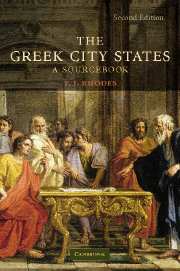Book contents
- Frontmatter
- Contents
- List of Maps
- Preface to the First Edition
- Preface to the Second Edition
- Map 1 The Greek World
- Map 2 Attica
- Introduction
- 1 The Homeric State
- 2 The Archaic State
- 3 Economic and Political Development; Tyranny and After
- 4 Sparta
- 5 Athens
- 6 Women and Children
- 7 Economic Life
- 8 Religion
- 9 Other Cities
- 10 Beyond the Single City
- 11 The Hellenistic and Roman Periods
- Bibliography
- Index of Texts
- Index of Names and Subjects
Preface to the First Edition
Published online by Cambridge University Press: 05 June 2012
- Frontmatter
- Contents
- List of Maps
- Preface to the First Edition
- Preface to the Second Edition
- Map 1 The Greek World
- Map 2 Attica
- Introduction
- 1 The Homeric State
- 2 The Archaic State
- 3 Economic and Political Development; Tyranny and After
- 4 Sparta
- 5 Athens
- 6 Women and Children
- 7 Economic Life
- 8 Religion
- 9 Other Cities
- 10 Beyond the Single City
- 11 The Hellenistic and Roman Periods
- Bibliography
- Index of Texts
- Index of Names and Subjects
Summary
The Greek philosopher Aristotle wrote that ‘man is by nature a political animal’, that is, one for whom life can best be lived in poleis, or city states (Politics, I. 1253 a 2–3, III. 1278 b 19). The purpose of this book is to present the world of the Greek city states, through a selection of ancient texts in translation, to students of ancient Greece and to students of political institutions. Its primary concern is with how the various states were governed, though a few texts of a more theoretical nature are included; it is not intended as a source book for narrative history, though inevitably it includes some texts of importance to students of narrative history.
It is not always certain what the correct reading of an ancient text should be (cf. p. 8). I have translated what I believe to be the correct readings, occasionally but not systematically mentioning alternatives which may be encountered: some texts have to be identified by reference to particular modern editions, but these editions are cited for purposes of identification only, and I have felt free to diverge from them at points where I believe them to be mistaken.
The translations are all my own. I have consulted other translations intermittently, so when my version is identical with another this will be due sometimes to coincidence, sometimes to my finding in the other version an expression on which I could not improve.
- Type
- Chapter
- Information
- The Greek City StatesA Source Book, pp. ix - xPublisher: Cambridge University PressPrint publication year: 2007



